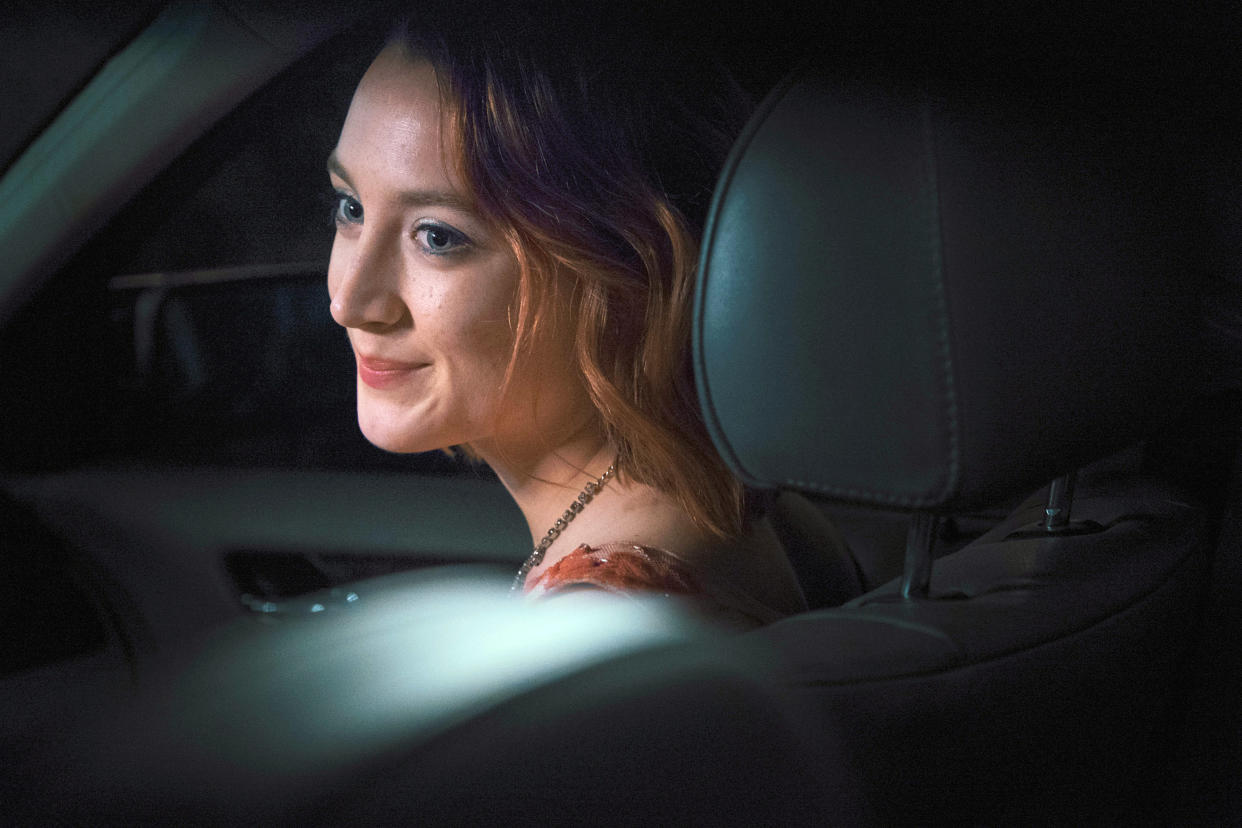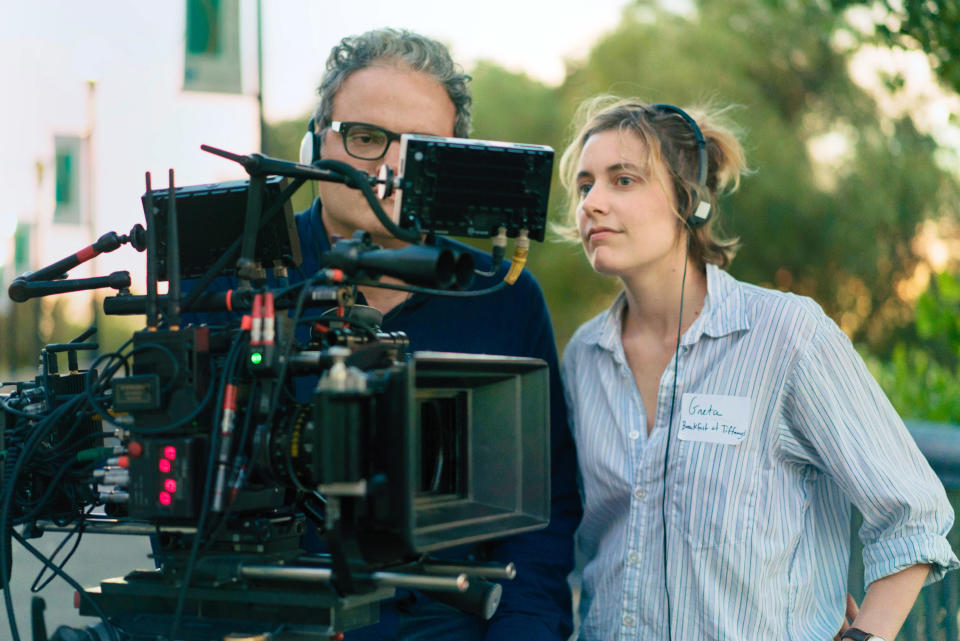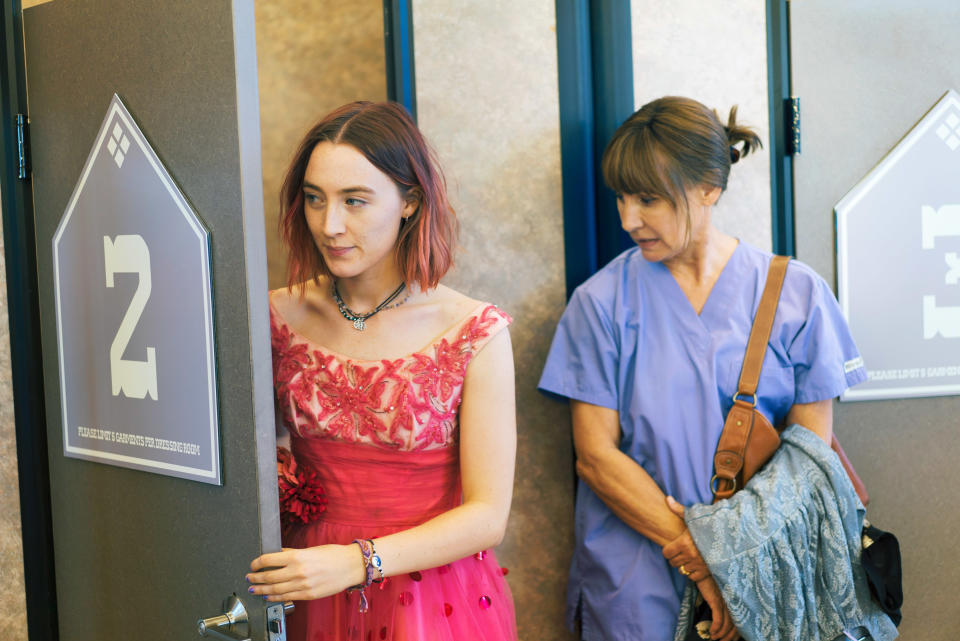'Lady Bird': How Greta Gerwig gave wings to her Oscar-buzzing directorial debut

Lady Bird, the solo directorial debut of actress and writer Greta Gerwig, has inspired the kind of response every first-time filmmaker dreams about. With a 100 percent fresh rating on Rotten Tomatoes and a largely sold-out opening weekend, the deeply observant, funny, and moving Lady Bird is off to a strong start in the run-up to awards season. Gerwig, naturally, is beyond thrilled. “It’s extraordinary. I’m over the moon,” she told Yahoo Entertainment, going on to describe all the texts and photos she received from screenings across the country. As personal as Lady Bird is for the writer-director, it feels just as personal for the audience — not an easy feat, especially given that the film industry has largely shunned realistic portraits of teenage girls.
The movie takes place between 2003 and 2004, following a Sacramento, Calif., teenager (Saoirse Ronan) as she completes high school and begins her freshman year of college. Our heroine is named Christine, but much to the annoyance of her mother, Marion (Laurie Metcalf), she insists on going by Lady Bird. (When a teacher at her Catholic school asks, “Is that your given name?,” she replies, “I gave it to myself. It’s given to me, by me.”) The new name is one of Lady Bird’s many attempts to pin down her own fluttering identity; others include joining the drama club, dating two very different boys (Lucas Hedges and Timothée Chalamet), defying her Catholic upbringing, questioning the closeness of her best friend (Beanie Feldstein), and, most important, navigating the relationship between herself and her mother as she prepares to leave home.
Though its story is simple, Lady Bird contains multitudes; complex issues like personal versus public faith, the dissolution of the middle class, and the anxiety of post-Sept. 11 America simmer beneath the story of a strong-willed daughter and her loving, infuriating, all-too-familiar mother. Yahoo Entertainment spoke with Gerwig about bringing Lady Bird’s vivid world to the big screen, Dave Matthews Band songs and all.

Yahoo Entertainment: This movie covers two of my very favorite themes, religion and musical theater.
Greta Gerwig: Me too!
Tell me why those were touchstones for you.
Lady Bird sort of moonlights in musical theater as she’s on her way up. I was a “musical theater kid.” I did tons of musicals. I loved musicals far more than I actually had the talent to be in musicals. But I think it was the vividness of the emotions in musicals, because it really is that thing of, when you feel so much, you have to sing. That was something I very much related to and loved. And my love goes back to really young! I saw a production of Starlight Express when I was 5, and my mind exploded. I waited for the double cassette to arrive at the Tower Records from the original cast recording. I mean, I was very invested in it. So that was the baseline.
And then for me, being that person, Stephen Sondheim was king. So I had written [the Sondheim musical] Merrily We Roll Along into the script, but I didn’t really know if I would be able to get permission to use it. I wrote him a letter, and I was lucky enough that my producer Scott Rudin is also a theater producer, and he got the letter to Stephen.
Did you actually have a conversation with Stephen Sondheim about the film?
I still have never met him! I’ll ask for it soon. I’ll call in that favor.
What about the theme of religion?
I went to Catholic school. In a way, I think it’s easy to play that for a joke in a film. And it’s not that we don’t have any jokes, but I wanted it to feel like the school was made up of individuals who had their own particular experiences and senses of humor, and that they were in the middle of their own story, because I think sometimes it can get reduced to just the uniform of the priest or the nun, and the rules, and you lose the sense of how there are really interesting people there.

And how each of those people is on a different faith journey. One movie I actually thought of while watching Lady Bird was The Trouble With Angels [the 1966 film about Catholic schoolgirls directed by Ida Lupino, the first woman to be accepted into the Directors Guild of America].
Oh, yeah! Right! That’s so funny, no one’s mentioned that to me before, but that’s true! I mean, I didn’t want to be too — you know, at the end of the film, when she walks into the church, it’s not specifically that she is experiencing something religious. But it’s that thing of, [this is] the place that you grew your roots, and the returning, and that there is meaning in it. And to me, religion is fascinating, all religions, because it’s a primary story that people tell themselves about what matters and how to build a moral universe, and how to decide how to move on with your life and what you’re going to do. To treat that seriously was something I was interested in.
I understand that your first draft was extremely long.
So long.
How did you choose which moments and milestones to include? It felt epic, like I’d lived through my entire senior year of high school again, and yet very specific and self-contained.
Well, it’s my way to overwrite. I always knew that the core of the story was the love story between a mother and a daughter. The original draft that was so long was called Mothers and Daughters. One way I do it is, I actually try to almost spread it all out like a quilt and look at it like — this sounds completely silly, but do you remember those Magic Eye paintings from the ’90s? They were always at dentists’ offices and stuff? It’s almost like looking at a Magic Eye painting and the story comes out at you.
And then you go through all these revelations. Maybe you’ve had two separate characters that you suddenly realize are the same character. Or some plot line that felt important actually now has fallen away. It’s a very long process. [Laughs] But I just kept returning to, how does this tell this story? How does this tell this story of home, how does this tell this story of personhood, how does it tell this love story between a mother and daughter? And that was always what I was asking myself about each scene.
And when I cut something, I would put it in a separate file that said “Cut Things,” and I’d think to myself, “Well, if you really miss it, you can put it back, but why don’t you see if it works without it?” But that’s just the process of writing. You have to kill your darlings.
One thing that this movie really drives home is how teenagers have an incomplete picture of their parents. Yet you managed to show Lady Bird’s version of her mother without cheating the mother out of being a full character.
It was really important to me that, even though you’re following Lady Bird and you are in her reality, that you have all these little moments where you’re with the other characters that she doesn’t know about. And it could be as simple as, after they find out the casting of the play, we stay with [Feldstein’s character] Julie for a second to see how much it meant to her that she got this. Or that we’re with the father at the job interview. Or that we see her mother at work with a co-worker. You get these moments where you just can’t know everything.
To me, the scene that’s most vividly that is when her mother fixes the dress and then hangs it up. Because it’s this moment of: Your parents do so much that you’ll never know. And the complicated thing about life is that you inevitably won’t appreciate it. [Laughs] And they do it anyway. And they will keep doing it anyway.

You also capture the existence of this kind of quiet, reflective boredom that existed for kids before cellphones and screens were omnipresent. How did you help your cast to understand that?
[Laughs] I know, they’re such a young cast. They never knew a time! Yeah, that was really important to me. The movie is set slightly after when I was in high school, and I definitely wanted it to be in a very soon-after-post-9/11 world, in that we were in the midst of experiencing a national trauma; we were also in a war in Afghanistan; we were getting into a war in Iraq; cellphones and the internet were starting to rise but they weren’t there yet; this erosion of the middle class was speeding up; and it felt, in a way, that I could talk about now without having to set it now. Because I think if you set a movie now, I don’t know how you do it without having a ton of smartphones. And I think they’re just tremendously uncinematic, they’re not fun to shoot or look at.
And one thing I do on my sets — I do this anyway, this is not time-space specific, and I stole this from Noah Baumbach — no cellphones on set. If you need to make a phone call or text someone, you can leave the set. So none of the cast ever brought their cellphones on set, none of the crew. Because I think there’s just nothing that makes you more bummed out than looking over and seeing someone texting while you’re trying to concentrate. And the truth is, I think most people find it to be a relief to not have it with them. I think they think, “Oh God, thank God, I don’t have to look at it.”
But some of it was talking about, before the internet, you wouldn’t know where everybody was all the time. If you wanted to find someone, you’d have to go to the coffee shop where you think they might be and hang out there until they showed up. That was a thing that would structure time.
And also, that you wouldn’t have access to music and movies and taste through the internet. Now everybody has Spotify playlists and Pinterest and all this stuff. And really at that moment, it was still much more of a monoculture, in terms of how people received culture. You listened to the radio and you read magazines. Now it’s like everything can be so specified to your niche. And then it was kind of like, looking for what felt like it was special to you in the context of it being the thing everyone was listening to.
Yes, because I was thinking about “Crash” by the Dave Matthews Band, and how it was a big song when I was in high school in the late ’90s. My first thought when the song showed up in the film was, “Would they still have been listening to this in 2003?” And then I realized, of course they would have, because pop culture stuck around longer back then. You didn’t have the internet giving you all these things that pop up and immediately fade.
I was really conscious, especially in the music, that I didn’t all want it to be from 2003. We have the Justin Timberlake song [“Cry Me a River”], which did come out in late 2002, so that was exactly in that time. But Dave Matthews and Alanis were still on the radio, especially on the “alternative” station. Do you remember the alternative station? Every town had one. It actually wasn’t even until I was in high school that a real, genuine top 40 station came to Sacramento. And it was 107.9 The End. It played chart-topper hits, but it wasn’t specifically hip-hop, or it wasn’t specifically alternative. And I remember it was a big moment of, like, “Oh, this is playing the hits.”
Are you familiar with the website Letterboxd? It allows you to track the movies you’ve seen, and it allows users to create their own genres for grouping films. One of my favorite genres that someone made is “Greta Gerwig Can’t Make the Rent,” and it includes Frances Ha, Mistress America, and 20th Century Women.
[Laughs] That’s really funny.
It is! But I also thought it was interesting that financial anxiety has been a recurring theme in the films you’ve written or starred in.
Yeah, well, I think it’s a theme in general. I think Americans have a lot of trouble talking about class. It’s something we don’t want to talk about. It’s funny, I read that 70 percent of Americans describe themselves as being middle class, and that’s whether they live below the poverty line or they’re in the 1 percent. There’s this aversion to saying anything about limitations that your financial background gives you. And I think it’s something that I see in action all the time, and it’s a big thing that shapes a lot of people’s lives. And within that, there’s a lot of decisions that get made.
I was very moved by that when I watched [the 2014 Richard Linklater film] Boyhood. The family was OK. Nothing bad happened. But it’s almost like they were three bad breaks from it all falling apart. You could sense it. It was palpable. And I think it’s something I’ve always been interested in exploring.
Before I go, I need to know how much of Merrily We Roll Along you actually staged.
Oh, we did about five musical numbers, and they were all amazing. I think if DVD extras still exist, we should do the whole thing.
Lady Bird is now playing in select theaters. Watch the trailer:
Read more from Yahoo Entertainment:
Sam Rockwell on channeling American rage in ‘Three Billboards Outside Ebbing, Missouri’
Dana Carvey goes deep inside his controversial sketch show in ‘Too Funny to Fail’
Director Griffin Dunne on Joan Didion’s extraordinary life, and why she won’t write about Trump
Frank Oz restores dark original ending of ‘Little Shop of Horrors’ for Trump era (exclusive)

